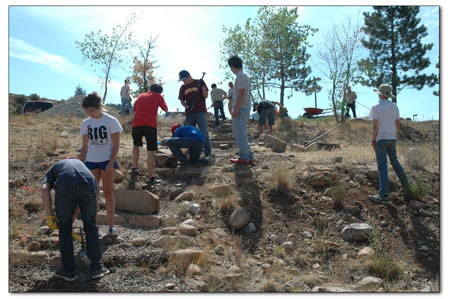
Members and friends of local Boy Scout Troop 501 build a staircase between the Humane Society and the Animas River so volunteer dog walkers can access the river. The project is one of many that Boy Scouts do as part of their community service component./Courtesy photo
Finding their way
Despite controversies, changing times, scouts soldier on in 21st century
by Philip Wiley
Gay haters. Destroyers of the environment. Boy Scouts. We’ve all heard these terms slung around, but recently, they often occur in the same sentence.
The goal of the Boy Scouts of America, according to the organization’s website, is to provide “… a program for young people that builds character, trains them in the responsibilities of participating citizenship, and develops personal fitness.”
But how well is this goal fulfilled? After all, in some circles, scouts have gained the aforementioned reputations. Just how relevant are these and other similar lessons of the 100-plus-year-old organization in modern society?
According to Steve Smith, 33, a local chemistry teacher at Animas High School who earned his Eagle Scout rank 17 years ago, scouting can help promote citizenship, stewardship of the environment and practical skills in the outdoors.
“Cooking, learning to read a map, picking a route that you’re going to travel over seven days, knowing you’re going to get the right amount food, knowing what reasonable goals are and how to coordinate efforts and people; those were all skills I learned,” said Smith, citing the myriad benefits scouting affords him.
However, some groups have been excluded from those benefits. Until Jan. 1, 2014, gays were not allowed to join the scouts and to this day, “open and avowed” homosexual adults are still not allowed to be troop leaders.
When asked about this policy, local scouts were of the same opinion. Perhaps local Eagle Scout Jonathan Smith, 15, summed it up best.
“A scout is trustworthy, loyal, helpful, friendly, courteous, kind, obedient, cheerful, thrifty, brave, clean and reverent,” he said, quoting the Scout Law, which scouts are taught to adhere to. “Nowhere in there does it say a scout is straight. Nowhere in there does it say a scout is gay. Nowhere in there does it say a scout is white (or) a scout is black.”
Jack Fultz, 20, another local Eagle Scout, agreed. “I believe (homosexuals) are our equals, and they should have the same opportunities.”
But what about environmental destruction? One of the more recent and well-known occurrences of this occurred in 2013 when a trio of scoutmasters toppled a 200-million-year-old rock formation in a Utah state park.
Steve Smith said while this incident was unfortunate, it is an isolated incident, and most scouts take great care in protecting the land.
“Scouting does a lot to promote a good wilderness ethic … and so when something like that happens, I don’t think that’s a reflection on the institution
of scouting,” he said. “That particular incident could have been any idiot and unfortunately he was wearing a uniform at the time.” 4
While local Eagle Scouts are willing to acknowledge scouting’s downsides, they think it is a worthwhile program. They also said they feel it is still relevant, even in today’s world. And they are not alone. In 2013, the most recent year for which numbers were available, 2.3 million boys ages 6 - 17 were involved in scouting, according to the BSA. Since its inception in 1910, more than 2 million have earned the rank of Eagle. Locally, there are two active troops: Troop 501 and Troop 507.
However, national numbers have been on a downward slide. Since 1997, when scouts numbered more than 3 million, participation has dropped off by nearly 25 percent. But that doesn’t mean it still can’t play an important role in the lives of those who do join.
“Scouting, at large, was really important for just exposing me to a lot of things that I still value and am passionate about, like rock climbing or backpacking or canoeing,” said Steve Smith. “The skills I have for experiences in the wilderness, a lot of them originated from scouting.”
Scouting also teaches boys to thrive in a setting without many of life’s conveniences and luxuries, according to adherents. In a world full of smart phones, GPS’s, microwave dinners, cars and indoor plumbing, it can be a way to reconnect with the environment and learn to survive in the wilderness if necessary.
To those who grow up in large cities, these things may seem unnecessary, unimportant or just plain boring. If this is all scouting has to offer, then to many, the notion could seem dated. However, according to Fultz and Jonathan Smith, there is more.
For Fultz, it’s as simple as being able to tie a good knot, something he never would have learned without scouting. “It’s extremely important everywhere you go, even in my job, and I work manual labor,” he said. “There’s just so much you learn in scouts that you don’t get to learn in ordinary, everyday life just going to middle school.”
Boy Scouts can also be a good way to meet friends and mentors, says Jonathan Smith. “Typically, I’m more myself around adults than I am with teen-agers my own age,” said Jonathan, who is the youngest Eagle is his troop. “You can be a 12-year-old kid just getting into scouts and there can be a 17-year-old about to get his Eagle, and that person has done so much and is just willing to share with that 12-year-old. Where else can you find a 12-year-old and a 17-year-old in the same room, wanting to get along, and learn and have fun?”
There is also another layer on top of these basics, the prestige of the rigorous Eagle Scout rank – which takes a minimum of three years to complete.
“It was one of the first long-term goals I set for myself and worked through and completed,” said Steve Smith. “I think that ability to set a long-term goal and work through it incrementally is a very important skill for anyone. It was valuable to do that in a setting with a lot of support and structure.”
Fultz agrees there are also real world benefits. “It definitely helped me get a job and that’s important.”
Being an Eagle can also be useful before even entering the workplace, as Jonathan Smith points out.
“I’m looking into college scholarships and … some colleges will accept you just based off the fact that you’re an Eagle Scout,” he said. “They put you in another pile because you’ve shown that you can commit to something for a long period of time.”
 Philip Wiley, a junior at Animas High School, learns the high-pressure ropes of newspaper delivery during his recent internship at the Telegraph. When not getting covered in newsprint, he is an aspiring Eagle Scout and sci-fi author.
Philip Wiley, a junior at Animas High School, learns the high-pressure ropes of newspaper delivery during his recent internship at the Telegraph. When not getting covered in newsprint, he is an aspiring Eagle Scout and sci-fi author.
In this week's issue...
- January 25, 2024
- Bagging it
State plastic bag ban is in full effect, but enforcement varies
- January 26, 2024
- Paper chase
The Sneer is back – and no we’re not talking about Billy Idol’s comeback tour.
- January 11, 2024
- High and dry
New state climate report projects continued warming, declining streamflows
